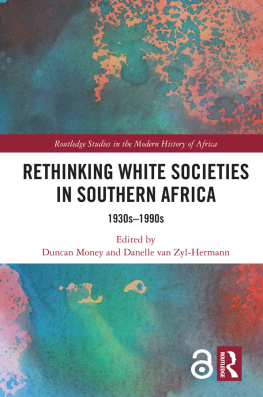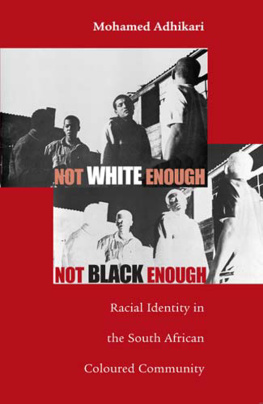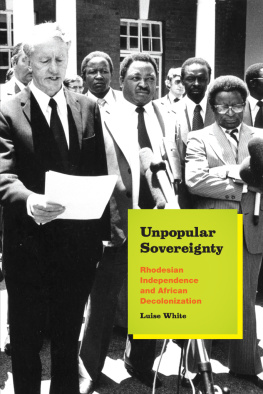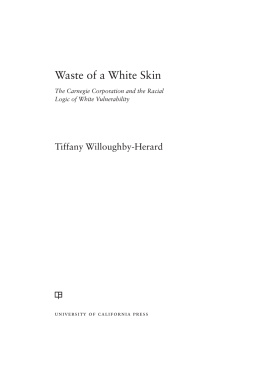Rethinking White Societies in Southern Africa
This book showcases new research by emerging and established scholars on white workers and the white poor in Southern Africa.
Rethinking White Societies in Southern Africa challenges the geographical and chronological limitations of existing scholarship by presenting case studies from Angola, Mozambique, South Africa, Zambia and Zimbabwe that track the fortunes of nonhegemonic whites during the era of white minority rule. Arguing against prevalent understandings of white society as uniformly wealthy or culturally homogeneous during this period, it demonstrates that social class remained a salient element throughout the twentieth century, how Southern Africas white societies were often divided and riven with tension and how the resulting social, political and economic complexities animated white minority regimes in the region. Addressing themes such as the class-based disruption of racial norms and practices, state surveillance and interventions and their failures towards nonhegemonic whites, and the opportunities and limitations of physical and social mobility, the book mounts a forceful argument for the regional consideration of white societies in this historical context. Centrally, it extends the path-breaking insights emanating from scholarship on racialized class identities from North America to the African context to argue that race and class cannot be considered independently in Southern Africa.
This book will be of interest to scholars and students of Southern African studies, African history and the history of race.
Duncan Money is a historian of Southern Africa whose research focuses on the mining industry. He is currently a researcher at the African Studies Centre, Leiden University, Netherlands and was previously a postdoctoral fellow at the International Studies Group, University of the Free State, Bloemfontein, South Africa.
Danelle van Zyl-Hermann is a historian of race and class in modern South Africa. She holds a PhD from the University of Cambridge and is currently a postdoctoral research fellow in the Department of History, University of Basel, Switzerland.
Routledge Studies in the Modern History of Africa
This series includes in-depth research on aspects of economic, political, cultural and social history of individual countries as well as broad-reaching analyses of regional issues.
Themes include social and economic change, colonial experiences, independence movements, post-independence governments, globalisation in Africa, nationalism, gender histories, conflict, the Atlantic Slave trade, the environment, health and medicine, ethnicity, urbanisation, and neo-colonialism and aid.
Forthcoming titles:
Miscegenation, Identity and Status in Colonial Africa
Intimate Colonial Encounters
Lawrence Mbogoni
Displaced Mozambicans in Postcolonial Tanzania
Refugee Power, Mobility, Education, and Rural Development
Joanna T. Tague
Africans and the Holocaust
Perceptions and Responses of Colonized and Sovereign Peoples
Edward Kissi
Photography and History in Colonial Southern Africa
Shades of Empire
Lorena Rizzo
Womens Lived Landscapes of War and Liberation in Mozambique
Bodily Memory and the Gendered Aesthetics of Belonging
Jonna Katto
Rethinking White Societies in Southern Africa
1930s1990s
Duncan Money and Danelle van Zyl-Hermann
For more information about this series, please visit: www.routledge.com
Rethinking White Societies in Southern Africa
1930s1990s
Edited by Duncan Money and Danelle van Zyl-Hermann

First published 2020
by Routledge
2 Park Square, Milton Park, Abingdon, Oxon OX14 4RN
and by Routledge
52 Vanderbilt Avenue, New York, NY 10017
Routledge is an imprint of the Taylor & Francis Group, an informa business
2020 selection and editorial matter, Duncan Money and Danelle van Zyl-Hermann; individual chapters, the contributors
The right of Duncan Money and Danelle van Zyl-Hermann to be identified as the authors of the editorial material, and of the authors for their individual chapters, has been asserted in accordance with sections 77 and 78 of the Copyright, Designs and Patents Act 1988.
The Open Access version of this book, available at www.taylorfrancis.com, has been made available under a Creative Commons Attribution-Non Commercial-No Derivatives 4.0 license.
Trademark notice: Product or corporate names may be trademarks or registered trademarks, and are used only for identification and explanation without intent to infringe.
British Library Cataloguing-in-Publication Data
A catalogue record for this book is available from the British Library
Library of Congress Cataloging-in-Publication Data
A catalog record for this book has been requested
ISBN: 978-0-367-37642-0 (hbk)
ISBN: 978-1-003-00230-7 (ebk)
Typeset in Bembo
by Apex CoVantage, LLC
Contents
DUNCAN MONEY AND DANELLE VAN ZYL-HERMANN
JONATHAN HYSLOP
IVO MHIKE
GEORGE BISHI
BILL FREUND
CAIO SIMES DE ARAJO
CLUDIA CASTELO
NICOLA GINSBURGH
DUNCAN MONEY
NEIL ROOS
DANELLE VAN ZYL-HERMANN
Guile
The chapters collected in this book were presented and discussed during a February 2018 workshop, Poor, Precarious, White? Rethinking white societies in Southern Africa, 1930s1990s, hosted by the International Studies Group at the University of the Free State, Bloemfontein, South Africa. The event was generously funded by a grant from the University of the Free State. For this, we would like to express our sincere gratitude to Lis Lange, then Deputy Vice Chancellor (Academic), for her immediate enthusiasm and support for the project, which were key to facilitating the financial, intellectual and organisational support it received. We were thrilled by the suggestion from Leanne Hinves, Routledges editor for African Studies, to turn this intellectual project into a book and are grateful for the excellent support we have received from her throughout the process. This book has benefitted immensely from the intellectual generosity of colleagues in related fields. We were delighted when David Roediger, whose inspiring work played an important role in shaping the conception of this project, agreed to provide a Foreword to the book. Our heartfelt thanks to those colleagues who provided feedback on earlier drafts of the book. In particular, we would like to thank Ian Phimister, David Roediger, Deborah Posel and Rory Pilossof for their comments on the introductory chapter and extend a special thanks to Neil Roos for his intellectual input. We are also grateful for the suggestions received from the anonymous reviewers, which helped refine the book. We would like to warmly thank Jenny Lake and Ana Rita Amaral for their editorial and technical assistance in preparing the text. Finally, a special and heartfelt thank you to Ian Phimister. It has been a privilege and pleasure to benefit from his mentorship, encouragement and good humour, not to mention his expertise. This project is a product of and tribute to the convivial and supportive atmosphere which he facilitates at the International Studies Group.







